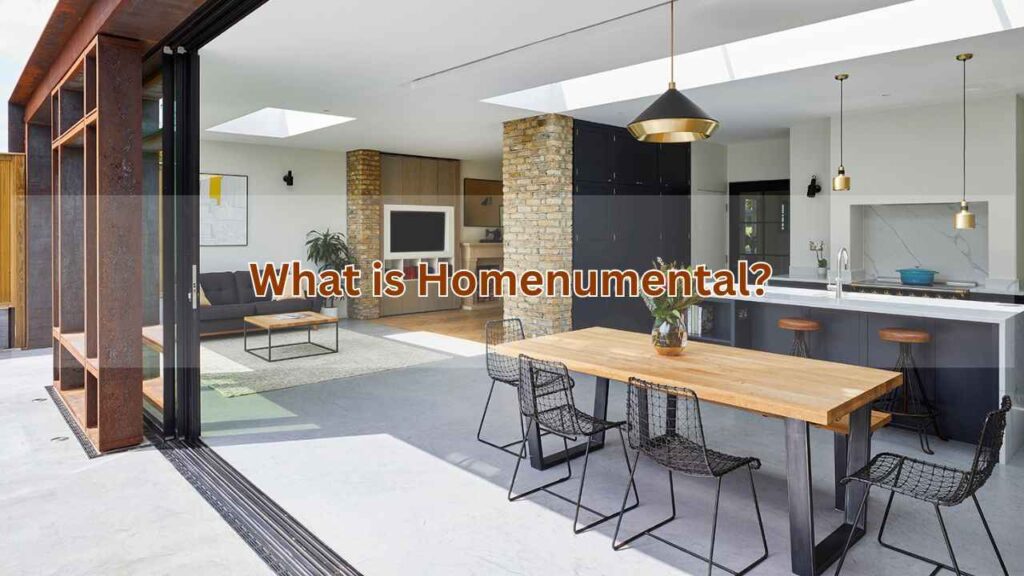Figuring out how to design home renovation homenumental isn’t as scary as it sounds.
Home renovation is basically giving your house a fresh look or fixing up parts that need work.
Most folks start renovating because something’s broken, they want more space, or they’re just tired of looking at the same old walls.
The tricky part? Knowing where to start and not blowing your budget on things that don’t matter.
Thoughtful renovation design makes ALL the difference between a makeover that looks dated in five years and one that stays gorgeous for decades.
This is where the homenumental approach shines. It’s not about following every passing trend. It’s about creating spaces that feel both fresh and timeless at the same time.
In this post, we’re diving into what makes a renovation truly “homenumental” and walking through each step of the process.
What is Homenumental?

Homenumental is basically the sweet spot between show-stopping design and actually living in your home.
It’s an approach that puts equal weight on “wow factor” and “I can actually relax here.”
Think of it as bringing museum-worthy design elements into everyday spaces.
Your kitchen might have the clean lines of modern architecture, but it still needs to be a place where you can make Sunday pancakes without feeling like you’re messing up a showroom.
The beauty of homenumental design is how it borrows from classic architectural elements but updates them for today’s living.
Like those gorgeous crown moldings from Victorian homes paired with sleek furniture.
Or dramatic arched doorways leading to rooms with smart home features.
Old meets new in the best possible way.
How to Design Home Renovation Homenumental?

Starting a homenumental renovation means thinking bigger than just picking pretty fixtures or paint colors.
It’s about creating spaces that tell your story while standing the test of time.
The process isn’t complicated, but it does take planning.
You’ll need to honestly assess what you have, dream about what you want, and figure out how to bridge that gap.
The magic happens when you blend timeless elements with your personal style and modern conveniences.
Check the Existing Condition
First things first – you need to know what you’re working with. And I don’t just mean a quick glance around.
Get down and dirty with your house. Look behind furniture. Peek under carpets. Check out the bones of your home.
Are your floors actually level? Because mine sure weren’t when I started my last reno.
Look for hidden treasures too. Sometimes those 1970s renovations covered up gorgeous original details.
And don’t skip the unsexy stuff like electrical, plumbing, and foundation issues.
Nothing ruins a beautiful renovation like a surprise water leak six months later.
Identify your Renovation Goal
Why are you actually doing this renovation? Be honest with yourself.
Write down your top three goals.
Mine for my kitchen reno were: more counter space, better lighting, and a layout that let me talk to people while cooking.
Having clear goals helps you make decisions later when you’re choosing between options.
The best homenumental renovations solve real problems while making your space more beautiful. That’s the sweet spot.
Don’t just renovate because you saw something pretty on Pinterest.
Your home needs to work for your life.
Priorities Renovation Budget
Let’s talk money. Because renovations ALWAYS cost more than you think.
Figure out your max budget. Then subtract 20% for surprises. Because there will be surprises.
Splurge on the things you touch every day. Door handles, faucets, light switches.
These small details make a huge difference in how your home feels.
Save on things that can be easily changed later. Like paint colors or decorative accessories.
Know where the money goes in renovations.
Labor is usually about 60% of costs. Materials make up the rest.
My contractor gently suggested I pick again if I wanted to actually finish the bathroom.
Remodeling Guide
Having a plan saves time, money, and your sanity.
Create a timeline that makes sense. Demo, structural work, electrical, plumbing, drywall, paint, finishes. Things need to happen in the right order.
Decide what you can DIY and what needs professionals. Be realistic about your skills.
I thought I could install my own kitchen backsplash. Three broken tiles later, I called a pro.
Get everything in writing when working with contractors. EVERYTHING. Change orders are where budgets go to die.
Plan for how you’ll live during the renovation.
Can you cook without a kitchen? Shower without a bathroom? Sometimes the cost of a short-term rental is worth your mental health.
Key Renovation Zones
Some areas give you more bang for your buck than others.
Kitchens sell houses, but they’re also where families gather. Worth investing in quality appliances and durable surfaces.
Bathrooms need to be functional first, beautiful second.
Nothing worse than a gorgeous bathroom with terrible water pressure.
Entryways set the tone for your whole house. Don’t skip this area even though it’s small.
Living spaces need flexibility. Our living patterns change over time, so create spaces that can evolve.
Outdoor spaces count too. A usable outdoor area basically adds another room to your home for a fraction of the cost.
Adaptable Interior Design
The most homenumental spaces can change as your needs do.
Choose neutral backgrounds for permanent elements like flooring and countertops.
Add personality with things that are easier to change.
Think about future needs. Will those steep stairs work when you’re older? Is that tiny bathroom going to be a problem if you have kids?
My neighbor installed pocket doors in their renovation.
Total game changer for their small space – no need to account for door swing.
Flexible furniture arrangements work better than built-ins in most spaces.
Invest in Quality Furniture
Good furniture is worth saving up for.
Buy the best quality you can afford for pieces you use daily. Your back will thank you for a proper mattress and supportive sofa.
Vintage and antique pieces add instant character to new renovations. They’ve already stood the test of time.
Solid wood, beautifully made, and it adds warmth to my otherwise modern kitchen.
Skip trendy shapes and patterns for big purchases.
That waterfall-arm sofa might look dated in five years. Remember that reupholstery is always an option for quality frames.
Sustainable Interior Designs
Going green isn’t just good for the planet – it makes for better living spaces, too.
Use natural materials when possible. Wood, stone, cotton, wool.
They age beautifully and don’t off-gas.
Consider energy efficiency in every choice.
Better windows, proper insulation, and efficient appliances pay for themselves over time.
Repurpose and upcycle where you can. Those old wood floors might make beautiful open shelving.
Water conservation matters too. Low-flow fixtures have come a long way from the weak showers of the past.
Choose local materials when possible to reduce transportation impact and support your community.
Smart Home Integration
Technology should make your home work better for you, not complicate things.
Start simple with smart lighting and thermostats. They’re easy to install and make a big difference.
Plan for plenty of outlets and USB ports. We never have enough charging spots.
Consider what systems work together before buying. Nothing more frustrating than smart devices that won’t talk to each other.
Hide the tech when possible. Beautiful spaces don’t have wires hanging everywhere.
Remember that technology changes fast. Create systems that can be updated without tearing out walls.
Final Touches
The little details make a renovation feel complete.
Lighting makes or breaks a space. Include ambient, task, and accent lighting in every room.
Hardware pulls everything together. Cabinet knobs, door handles, and light switches are like jewelry for your home.
Art and accessories tell your story. Display things that mean something to you, not just stuff that matches the couch.
Plants bring spaces to life. Literally. Even if you don’t have a green thumb, try some hard-to-kill varieties.
Don’t rush these final steps. Sometimes living in the space for a bit before adding these touches helps you figure out what’s really missing.
Conclusion
Looking back at everything we’ve covered, learning how to design home renovation homenumental is about balancing timeless design with practical living.
It’s finding that sweet spot where your home looks amazing and works perfectly for your daily life.
The approach we’ve walked through – from honestly assessing what you have to making thoughtful choices about where to invest.
Creates spaces that feel special without being precious.
Your home should impress guests, sure, but more importantly, it should make YOU happy every time you walk through the door.
Homenumental design isn’t about following rules or copying what everyone else is doing.
It’s about creating spaces that reflect who you are while standing up to changing trends and family needs.
When your renovation honors both the history of your home and the reality of how you actually live, that’s when the magic happens.
That’s when your house truly becomes a home worth showing off.

